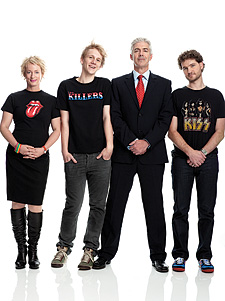 A charismatic host firing questions at sharp team captains and interesting guests, about a topic everyone can feel they know something about. The ABC's successful music quiz show Spics & Specs? No. TEN's Talkin' ‘bout your generation - and sadly for it, that's where the comparisons end.
A charismatic host firing questions at sharp team captains and interesting guests, about a topic everyone can feel they know something about. The ABC's successful music quiz show Spics & Specs? No. TEN's Talkin' ‘bout your generation - and sadly for it, that's where the comparisons end.
Talkin' ‘bout your generation would have looked great on paper to TEN's programming department. Host Shaun Micallef is a celebrated Australian comedian; the inability for generations to understand each other is proverbial. The idea of Shaun forcing teams drawn from the self-satisfied Baby Boomers, the embittered Generation X, and the globally-aware Generation Y to combat each other in a quiz of general knowledge should have been a hit. After all, it has 'something for everybody' right? Sadly, no. Talkin' bout your generation is profoundly 'disconnected' at almost every level.
The problems begin at the ground level and work their way up. The set is overly large, reinforcing a distance between host and talent. The strange plinths on which the teams sit emphasise the adversarial nature of the conflict, and the overly technical 'game board' guarantees to turn even the easiest segment into a head-scratcher. The activities themselves are often staggeringly simple yet ultimately unengaging. Unlike successful examples of the comic quiz format - Spics & Specs, Theatre Sports and What's My Line spring to mind - the good vibe and energy just leak away.
You would think that a comedian of Shaun Micallef's calibre could pull it all together, but here the producers have made another fatal mistake. Micallef's trademark is witticisms rather than belly-shakers. Consequently his grade-A punch lines always take that extra second to dawn on his competitors and the audience, and the show's pace suffers continually. And increasing the internal sense of disconnection is the host's propensity to make targets of his team captains. As a result they are more defensive than participatory - and who could blame them? Generation Y regular Josh Thomas is a frequent whipping boy, so much so that it makes me wonder what attraction any of his contemporaries would find in the show. Overall the series has assumed the character of grandparents and parents nit-picking their progeny at a particularly dysfunctional family gathering.
At the heart of the show's problems, however, is the basis for the program itself - identifying people according to their generation. Even though 'Baby-boomer', 'Gen-X' and 'Gen-Y' are terms that have worked their way into Australia's vocabulary, I'm not sure how strongly people identify with them at a personal level. To begin with the program itself demonstrates just how broad these terms are, with the Baby Boomers answering Generation Y questions and Generation X gaining points from either side. The truth is we tend to grow up spread across the generations - dressing like Y, listening to our sister's X CDs and maybe even indulging in a few 'retro' BB interests and past-times. The 'tribes' that we do identify with are more narrowly defined, and our individualism revolts against the idea of wearing such a bland label.
Strangely, many people - Christians and non-Christians - believe that this is how God sees us. The Almighty Creator is similarly 'disconnected' with us, and supposedly relates to us as 'humanity' in the same way that He might relate to 'animals', 'plants' or 'asteroids'. It's what a theologian would refer to as agnosticism. It’s that very uncomfortable assumption that all our generations are only another generalised type to God that makes Him seem so unapproachable to many, and dissuades others from even trying. However you couldn't sustain this idea in the face of the life of God's Son.
Jesus, the Bible argues, is ". the radiance of God’s glory and the exact representation of his being," (Hebrews 1:3), and so the best reference point for his Father's character. And what do we see the Son doing? We see Jesus going out of his way to travel through Samaria so that he can have a specific conversation with a particular woman standing by a well. We see him having compassion on one widow from the town of Nain whose only son has died, and giving him back to her. Possibly most powerfully, we see him stopping to talk to a leper on the outskirts of Galilee who says, "Lord, if you are willing, you can make me clean." What is Jesus response?
"I am willing. Be cleansed!" (Luke 5:13)
No broad labels for Jesus. He deals with characters and problems at the individual level. And he knows the best cure - himself.

























